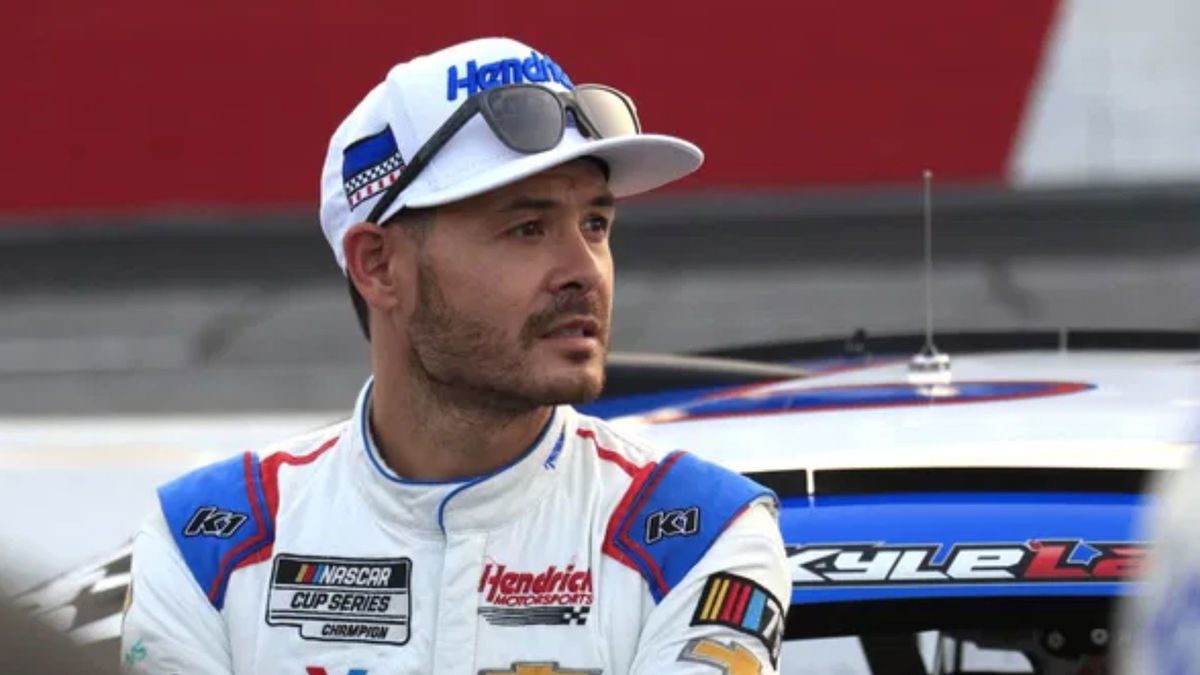
Imago
NORTH WILKESBORO, NC – MAY 21: Kyle Larson 5 Hendrick Motorsports HendrickCars.com Chevrolet talks with members of his crew prior to the running of the NASCAR, Motorsport, USA Cup Series All-Star Race on May 21, 2023 at North Wilkesboro Speedway in North Wilkesboro, NC. Photo by Jeff Robinson/Icon Sportswire AUTO: MAY 21 NASCAR Cup Series All-Star Race EDITORIAL USE ONLY Icon2305213010

Imago
NORTH WILKESBORO, NC – MAY 21: Kyle Larson 5 Hendrick Motorsports HendrickCars.com Chevrolet talks with members of his crew prior to the running of the NASCAR, Motorsport, USA Cup Series All-Star Race on May 21, 2023 at North Wilkesboro Speedway in North Wilkesboro, NC. Photo by Jeff Robinson/Icon Sportswire AUTO: MAY 21 NASCAR Cup Series All-Star Race EDITORIAL USE ONLY Icon2305213010
“I think it’s gotten a little bit stale…the racing obviously, the product and all that.” When a Cup Series star who has won three out of 12 races and led a mind-blowing 817 laps in 2025 says this, you need to take him seriously. That star is none other than Hendrick Motorsports #5 Kyle Larson. The 2021 Cup Series Champion recently soared to success in Kansas, leading 221 of 267 laps. Despite this domination, Larson acknowledged the Next-Gen car’s shortfalls this season, and a NASCAR veteran could do nothing but agree.
Watch What’s Trending Now!
Ken Schrader, a 4-time Cup Series race winner, has a love story with speed himself. He continued to explore that story to all extents until late last year, winning dirt or pavement Modified races. So Schrader has an acute sense and a sharp memory that support Kyle Larson’s demands.
Kyle Larson finds a voice of support in a veteran
Well, Kansas Speedway may have been entertaining, as the Next-Gen car works the best at the 1.5-mile track. However, the glaring issues can be visible at superspeedways like Atlanta Motor Speedway. The 2025 Ambetter Health 400 race was peppered with cautions and wrecks as drivers could not manipulate their cars well. Ryan Blaney had grabbed the pole with a lap time of 30.908 seconds and an average speed of 179.371 mph. The glaring lack of speed in these numbers is visible when you compare them with a legendary event 28 years ago. Long before NASCAR repaved the weather-beaten surface of AMS and lifted the banking to severe angles, Geoff Bodine created history. The jaw-dropping difference in speed is what convinced Kyle Larson to press for a rise in horsepower.
During the 1997 qualifying session, Bodine displayed 197.478 miles per hour, almost 10 miles per hour faster than the previous AMS race. That was a time when NASCAR drivers raced cars producing upward of 900 horsepower, compared to the present 670 hp. In a recent interview with Kenny Wallace, Ken Schrader reflected on this disparity: “In Atlanta, in 1997, 28 years ago, right? Geoff Bodine ran a 27.08 to get the pole. This year, the pole was a 30.90. Eh, that’s close to four seconds slower. Did Atlanta become a drafting track because they put 4 more degrees bank in it or whatever? No, they slowed the cars down so damn much that you don’t have to let off.” So Schrader agreed with Kyle Larson‘s demand: “So I think the cars do need more power.”
More horsepower – yes or no? 🤔
Don’t miss this week’s Herm & Schrader! Tune in now! 🎧
Spotify: https://t.co/kTJjty7Rt5
Apple: https://t.co/mM9d7jhmFh
YouTube Channel: https://t.co/U0HVCxH4de@Kenny_Wallace | @KenSchrader pic.twitter.com/foHgF2LhR3— Dirty Mo Media (@DirtyMoMedia) May 14, 2025
Ken Schrader himself is no stranger to grabbing maximum speed. In a qualifying session for a 1999 Talladega Superspeedway race, Schrader reversed his 22nd fastest position in practice. He ripped a 48.421-second lap at 197.765 mph to reassert his early career reputation as a superspeedway driving expert. What is more? Schrader has continued his tradition of speed long after retiring from NASCAR and full-time racing. At the age of 69 last year, he won 14 dirt races at 10 different tracks in 2024. Schrader also co-owns Federated Auto Parts Raceway at I-55 in Pevely, a third-mile dirt track he has owned with Ray and Sue Marler for 30 years.
However, Kyle Larson and Ken Schrader are far from the only hypes harping on horsepower. At the start of May, Doug Yates, Ford Performance engine builder, said, “If we were to increase the power from 670 horsepower to about 750 horsepower, that probably wouldn’t be much of a change for us today,” and urged the governing body to be more “open-minded” to such opportunities. The main issue stems from the fact that everyone is mashing the gas, so no one can pass. Denny Hamlin echoed this sentiment on his Actions Detrimental podcast, too.
Hamlin said, “The more you can get us out of the gas, which means if we have more horsepower, we have to let off sooner. That gives us the opportunity to overtake. Fifty horsepower, while it may not be a game changer, any horsepower gain will be an advantage for passing.” Even a jump from 670 to 750 would be instrumental in giving a different edge to the current racing product. 900 horsepower days are a distant dream with rising engine costs, but 750 is something attainable.
Kyle Larson evidently has the support of the garage and experts of the sport, and it seems like NASCAR is finally paying heed to these concerns.
Ready to revamp speed limits
Well, Kyle Larson made his concerns clear after his Kansas victory. Chiming with his peers’ calls for a bump to 750 hp, Larson said, “I don’t know if it’s going to change the racing drastically or anything. It’s a decent size increase, but it’s not massive.” As it turned out, NASCAR executives delivered hints along the same lines of horsepower increase.
Given the ongoing passing struggles with the Next-Gen car on tracks like short tracks, road courses, and superspeedways, ‘Hauler Talk’ hosts could not help but broach the hot topic. The 750 number, instead of the current 670, is a popular target number right now for two reasons. Firstly, the Gen-6 car used a tapered space that allowed 750. And that is also the maximum number that can be reached in Gen 7 without significantly increasing costs.
Senior director of competition, Mike Forde, kind of predicted Kyle Larson’s incoming demands a week ago. He said, adding his concerns, “I’m sure that [horsepower] will come up this weekend, and that’s something that we’re going to look at seriously. You hear levels of 900, 1000 horsepower, whatever, I don’t know if that’s – that’s not on the table just because of the cost.” Meanwhile, Doug Yates also highlighted how the engine life decreasing with 900 horsepower would impact financially weaker teams, saying, “It’s not hard to [achieve 900 horsepower], it’s just, once you go there, it’s probably going to decrease the life of the engines and that’s a difference scenario or situation from our engine builders, as well as the economics of the engine side of business.”
Clearly, Kyle Larson’s words are heavily relevant to important stakeholders as well as veterans in NASCAR. Let us see when they meet reality.








